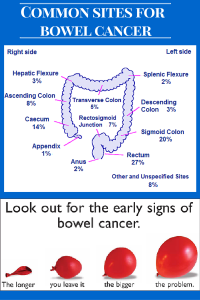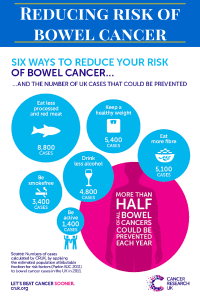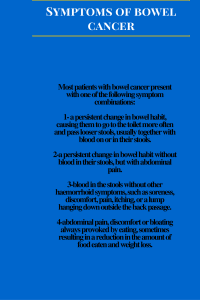Bowel cancer demystified
By Dr Brighton Chireka
Bowel cancer is fairly common and it occurs mostly in Caucasians aged over 50. Studies are sadly showing that it is rising in black Africans. If bowel cancer is diagnosed at an early stage , there is a good chance of a cure. If diagnosed late then the less chance that treatment will be curative. Having said that, treatment does often slow the progress of cancer regardless of its stage. I welcome the announcement by MDC leader Morgan Tsvangirai as it helps in raising awareness about bowel cancer. My prayers goes to Morgan Tsvangirai and his family as he fights this bowel cancer. I am optimistic  that he will overcome it because studies are in his favour as far as treatment of bowel cancer is concerned.
Why soft spot for Morgan Tsvangirai ?
It is common knowledge that I was once heavily involved with the MDC. I was appointed by Morgan Tsvangirai to be his representative in the UK in March 2004. I was involved in organising his meetings in the UK when he visited in November 2004 soon after being acquitted of treason. I had  the opportunity to have one on one discussion with him and was initially impressed but the drama that followed made me quit politics. The party split over whether to contest the 2005 senate election, into MDC-T, the larger party still led by Morgan Tsvangirai, and the MDC -Ncube, a smaller faction then led by Arthur Mutambara and currently led by Welshman Ncube.
Raising health awareness
I hanged my political boots in 2005 and I am now focusing on raising health awareness amongst mainly the black communities in the UK as well as Zimbabwe. The message is now spreading to the rest of Africa and the world as well. I have been able to achieve this by using the social media and at times featured prominent people in our community talking about their health. I welcome the revealing by MDC President Morgan Tsvangirai that he was diagnosed with bowel cancer and is undergoing treatment. When prominent people in our communities talk about their health ,it raises awareness and end the stigma to some of the diseases that we face.
Bowel cancer
This is sometimes called colorectal cancer and colorectal means the colon and rectum. It is one of the most common cancers in the United Kingdom. It can affect any part of the colon but it’s most commonly found in the lower part of the descending colon , sigmoid colon or rectum as shown below
Â
How does cancer begin?
Cancer begins in cells and cells are the body’s basic unit of life. Let me expand on what normally happens in our bodies and what can go wrong . The body is made up of many types of cells. These grow and divide in a controlled way to produce more cells that are needed to keep the body healthy. When cells become old or damaged, they die and are replaced with new ones. However, sometimes this orderly process goes wrong. The genetic material (DNA) of a cell can become damaged or changed, producing mutations that affect normal cell growth and division.
When this happens, cells do not die when they should and new cells form when the body does not need them. The extra cells may form a mass of tissue called a tumour . These cancerous cells can invade and destroy surrounding healthy tissue, including organs and spread to other areas, for example cancer of the bowel (tummy) can spread to the liver or lungs. This process of spreading is known as metastasis.
Bowel cancer in Zimbabwe rising.
In Zimbabwe colorectal cancer is traditionally thought to be rare but the diagnosis of this cancer in MDC president Morgan Tsvangirai gives us a different story. This is not only that Tsvangirai is a public figure but that the studies being carried out in Zimbabwe are calling for us to change our views on bowel cancer.
A retrospective study of colorectal cancer in Zimbabwe by Dr Katsidzira, Prof Gangaidzo and Prof Matenga which looked at cases from January 2006 to Dec 2011, demonstrates that colorectal cancer is as frequent a finding in Africans presenting for colonoscopy in Zimbabwe as it is among Caucasians. These African patients are often younger. The study also found that diverticular disease was present at higher that expected frequency among black African patients. This relatively higher than expected frequency of diverticular disease is possibly as a result of changes in dietary habits.
The “take away home message†is that colorectal cancer is an emerging challenge among black Zimbabweans. The public and doctors should be aware of the common symptoms such anaemia and weight loss in everyone regardless of the age. Bowel cancer in black Africans can present at a relatively young age, and thus young patients with the right clinical picture (symptoms) should be investigated just as thoroughly as older patients.
These findings that colorectal cancer is more frequently than common assumed should lead to the change in clinical practice among doctors in Zimbabwe and also funders should allocate more resources towards the prevention and treatment of bowel cancer. This is one of the reasons that I have decided to compile this article to raise awareness about bowel cancer. We used to think that it was rare but the truth of the matter is that it is rising in our community. The good thing is that it can be prevented and if diagnosed early it can be cured.
This does not apply to Zimbabwe only but there are other studies showing that colorectal is on the rise in Africa. A study on colorectal cancer trends in Kenya by Saidi H, et al showed that there was a 3-fold increase in the number of patients diagnosed with colorectal cancer at a single referral unit in Kenya between the periods 1993-1998 and 1999-2005.
What are the risk factors for bowel cancer?
Bowel cancer can develop for no apparent reason however there are certain risk factors that increase the chance that bowel cancer will develop. These risk factors include:
1- Ageing : In Caucasians bowel cancer is more common in older people . 80% of people who are diagnosed with bowel cancer are old than 60 years . In Zimbabwe it’s a different picture , black Africans are being diagnosed at a young age. One case reported in Zimbabwe is that of a 19 year old who was diagnosed with bowel cancer .
2-If a close relative has had bowel cancer
3-If you have colon disease such as ulcerative colitis or Crohn’s disease for more than 8-10 years.
4- Obesity
5- Lifestyle factors : not exercising , drinking a lot of alcohol.
REDUCING THE RISK OF GETTING BOWEL CANCER
Protective factors
People who eat a lot of fruit and vegetables have reduced risk of developing bowel cancer
So how do you know that you have bowel cancer ?
Let’s look at the symptoms of bowel cancer
At first it does not have any symptoms but as the tumour grows the following appears:
1- bleeding from the cancer . One may see blood mixed with faeces or blood can make faeces turn dark colour. The bleeding is not severe and may not be noticed but can lead to anaemia which will make one feel tired and look pale.
2- can pass mucus with the faeces
3- a change from one’s usual bowel habits causing bouts of diarrhoea or constipation
4- a feeling of not emptying the rectum after passing stool
5- Tummy pains
As the tumours becomes bigger and bigger the following can happen:
1- worsening of all symptoms stated above
2- one can feel generally unwell , tired or lose weight.
3- tumour can become bigger such that it can cause a blockage of the colon. This may results in severe abdominal pain, constipation and vomiting
4- the tumour can perforate the wall of colon resulting in a hole which can allow faeces to leak. This is a medical emergency and if not dealt with quickly can be fatal.
SOME OF THE SYMPTOMS OF BOWEL CANCER
How is bowel cancer diagnosed?
If one has any of the above symptoms they are recommended to see their doctor without delay . The doctor will ask further questions and examine the person. Depending on the findings the doctor may decide to carry out some blood tests or refer the person urgently to the specialist.
A specialist will carry out further tests and the most common one is colonoscopy . Colonoscopy is the looking of the whole of one’s colon and rectum using a long ,thin, flexible telescope called colonoscope. The colonoscope is passed through the anus into rectum and colon.
Other tests such as barium enema or CT colonography can be carried out .
A biopsy is usually taken and send for examination to confirm whether the tumour is a cancer. A biopsy entails a small sample of tissue being cut from a part of the body in this case the colon.
Staging of the cancer
If one is confirmed to have bowel cancer then further tests will be carried out to find out if the cancer has spread out or its confined to the colon only. This is called staging of the cancer and its aim is to find out:
– Is the cancer only in the colon and how much of the colon is affected
– Whether the cancer has spread to the local lymph nodes
– Whether the cancer has spread to other parts of the body such as lungs, liver , bone or brain ( metastasised)
The staging may be finalised after operation and it helps the doctors to decide the final treatment and also to determine the outlook of the condition ( chances of survival).
Treatment of bowel cancer.
Treatment options include surgery , chemotherapy and radiotherapy. Treatment will depend on the stage of the cancer and the general health of the patient.
Please note in the treatment of cancer we do not talk of cure but we use the word remission. Remission means there is no evidence of cancer following treatment. If you are in remission , you may be cured however in some people the cancer can return months or years later . This is why we are reluctant to use the word cured.
I hope you found this article useful and it has added knowledge to you. I urge you to see your doctor without delay if you have some of the symptoms mention in this article. There is no need to panic as some of the symptoms are very common and can be caused by other simple diseases.
I would also love to here from you as always your comments add value to me as well . Also please help me in raising health awareness by sharing this article with your friends.
This article was compiled by Dr Brighton Chireka , who is a GP and a blogger based in Kent in the United Kingdom. Feel free to contact him at info@docbeecee.co.uk and you can read more of his work on his blog at DR CHIREKA’S BLOG
Disclaimer: This article is for information only and should not be used for the diagnosis or treatment of medical conditions. Dr Chireka has used all reasonable care in compiling the information but makes no warranty as to its accuracy. Consult a doctor or other healthcare professionals for a diagnosis and treatment of medical conditions. Views expressed here are personal and do not in any way , shape or form represent the views of organisations that Dr Chireka work for or is associated with.
References
Saidi H, Nyaim EO, Githaiga JW, Karuri D.
World J Surg. 2008 Feb;32(2):217-23.
CORORECTAL CANCER TREND IN KENYA






